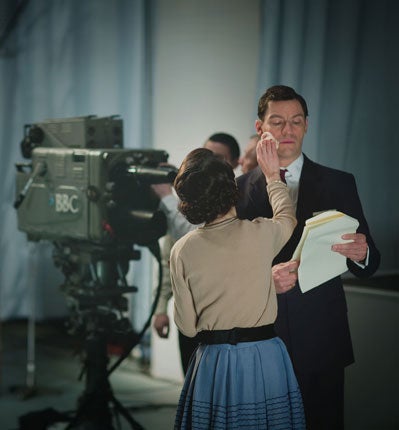The Hour, BBC2, Tuesday<br/>Britain Through a Lens, BBC4, Tuesday<br/>Fish Town, Sky Atlantic, Friday
The BBC's current affairs drama isn't the British 'Mad Men' – it's pacier and far better written

Your support helps us to tell the story
From reproductive rights to climate change to Big Tech, The Independent is on the ground when the story is developing. Whether it's investigating the financials of Elon Musk's pro-Trump PAC or producing our latest documentary, 'The A Word', which shines a light on the American women fighting for reproductive rights, we know how important it is to parse out the facts from the messaging.
At such a critical moment in US history, we need reporters on the ground. Your donation allows us to keep sending journalists to speak to both sides of the story.
The Independent is trusted by Americans across the entire political spectrum. And unlike many other quality news outlets, we choose not to lock Americans out of our reporting and analysis with paywalls. We believe quality journalism should be available to everyone, paid for by those who can afford it.
Your support makes all the difference.Journalists in the arts are frequently berated for declaring "this" to be the "new that", but if there's a better way to communicate the unknown than by reference to the familiar, human discourse has yet to discover it.
Nevertheless, it's choosing the terms of such equations that counts, so I'd love to know who first dubbed new BBC drama The Hour "the British Mad Men". Beyond its mid-1950s context (hardly nudging Mad Men's 1960 kick-off) and the attendant smoking, sexism and shapely silhouettes, the analogy isn't so much crude as bizarre.
For starters, The Hour is set a long way from Madison Avenue, in murky London. The opening finds young TV journalist Freddie (Ben Whishaw) posturing in the mirror before an interview for a job on a new current affairs programme. "The newsreel is dead," he declares, referring to the staple unit of the staid, old-style news he hopes single-handedly to revolutionise.
Sadly for Freddie, the coveted producer gig has already gone to Bel (Romola Garai), his best friend and a woman to boot. Nor is he qualified for the news presenter's spot; the debonair Hector Madden (The Wire's Dominic West) will be providing the lantern jaw and smooth patter. One strand of the first episode, then, was taken up with Bel's efforts to convince Freddie to swallow his pride and join her in a more modest role.
Meanwhile, announced by ominous vibrato that left us in no doubt that The Hour is a thriller at heart, a second storyline was being knitted into the characters' lives. It revolved around the grisly murder of an academic by a shady-looking man in a mac (the sartorial marker of dodginess, whatever the period). It's a conspiracy, a wild-eyed debutante tells an unconvinced Freddie, begging him to investigate; naturally, by the end of the episode, he's up to his neck in it.
Far pacier than Mad Men, then (good news if you like your drama to move faster than a glacier), its twists are shored up by Abi Morgan's fine script and a uniformly talented cast. Newsroom scenes milk the irony that the long view affords, but it is in the fuzzy ethics of investigative reporting that the series finds topical bite. We see Freddie slip a policeman a few quid for five minutes with the victim's body, then pocket evidence. Were it not for the current climate, I doubt the scene would have given me pause; maybe ethical questions are always clearer-cut when presented on an epic scale.
Watching Britain Through a Lens, which charted the fascinating history of the British documentary movement of the 1930s and 40s, it was impossible not to think of the idealistic Freddie. Led by single-minded Scotsman John Grierson, the disparate group of socially engaged chaps made hundreds of films lionising the work of ordinary people on which Britain depended. Hard to imagine anyone constructing a visual paean to the postal system these days, but Night Mail (1936), set to a poem by the film's young assistant director, one W H Auden, remains a mini masterpiece. Foolishly, I hadn't realised that some of the train scenes had been filmed in a studio, a reminder that the ethics of documentary, like news, have always been vexed. It's easy now to dismiss Grierson's faith in the power of film to heal social injustice as naive, but you have to admire the technical innovation and sheer conviction, particularly in an age where filming Katie Price getting hair extensions somehow passes for documentary.
Intriguingly, on Sky Atlantic, home of flashy US productions, the Griersonian documentary is having a revival. Fish Town is a 10-parter following the working lives of the inhabitants of Brixham, Devon. Perhaps crisis will erupt later, but so far it's a reassuringly quotidian affair. Preparations for the arrival of Princess Anne mainly seemed to involve repainting railings and reminding everybody not to swear. Whoever composed the dodgy "lyrical" voice-over (all "shoals of tourists") is no Auden, but I'd choose Fish Town over Katie Price's hair extensions.
Join our commenting forum
Join thought-provoking conversations, follow other Independent readers and see their replies
Comments